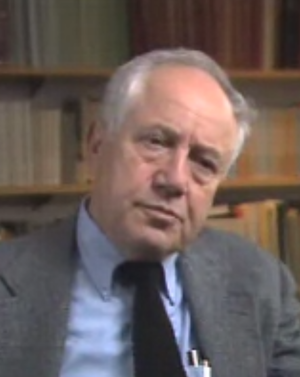Marshall Shulman
( reporter, academic, spook?) | |
|---|---|
 | |
| Born | 8 April 1916 Jersey City, New Jersey, USA |
| Died | June 21, 2007 (Age 91) |
| Nationality | US |
| Ethnicity | Jewish |
| Alma mater | • University of Michigan • Harvard University • Columbia University |
| Member of | Le Cercle |
Marshall Darrow Shulman was a spooky scholar of Soviet studies and the founding director of W. Averell Harriman Institute for Advanced Study of the Soviet Union at Columbia University. He attended two Bilderbergs, in 1964 and 1984, and an unknown number of Cercle meetings.
Background
Shulman received a bachelor's degree from the University of Michigan, a graduate degree in English Literature from Harvard University, and a master's degree from Columbia University's Russian Institute in 1948.
Career
From 1938-1939 he was a reporter for the Detroit News.
He began his career as an employee of the American mission to the League of Nations (1939-1940).
During World War II, he was in the US Air Force, as a glider pilot and in psychological warfare.
From 1949 to 1953 he worked at the US State Department. In particular, he served for three years as the Special Adviser to Secretary of State Dean Acheson[1]. In 1949, he was an information officer for the U.S. mission to the U.N..
In the 1960s, Shulman was the leading foreign policy expert of the Democratic Party. In 1977-1980. In the administration of US President Jimmy Carter, he was Special Adviser to Secretary of State Cyrus Vance on Soviet affairs with the rank of ambassador.[1] He was also an associate director of the Russian Research Center at Harvard University.[2] Since 1968 a Professor of International Politics at the Fletcher School of Law and Diplomacy, where he lectured on international politics.[1]
In 1966 he published the widely acclaimed book Beyond the Cold War, in which he predicted a policy of détente.
It seems to me, especially in retrospect, that um... the widespread impression at that time that the Soviets were, you know, expanding their influence wildly, is greatly exaggerated. In retrospect, their losses in that period, uh, were substantial too. And their gains were fairly limited. It's not at all clear uh, that they gained places of importance and of reasonable permanence. The possible exception of Cuba at that...in that period. But, certainly there is no reason why the United States shouldn't advance its interest when it can...uh, in responsible ways.[3] (Shulman in an 1986 interview)
He was a member of the Bergedorf Round Table of the Körber Foundation.
Events Participated in
| Event | Start | End | Location(s) | Description |
|---|---|---|---|---|
| Bilderberg/1964 | 20 March 1964 | 22 March 1964 | US Virginia Williamsburg | A year after this meeting, the post of GATT/Director-General was set up, and given Eric Wyndham White, who attended the '64 meeting. Several subsequent holders have been Bilderberg insiders, only 2 are not known to have attended the group. |
| Bilderberg/1984 | 11 May 1984 | 13 May 1984 | Sweden Saltsjöbaden | The 32nd Bilderberg, held in Sweden |
References
- ↑ Jump up to: a b c Иванян Э. А. Энциклопедия российско-американских отношений. XVIII-XX века.. — Москва: Международные отношения, 2001. — 696 с
- ↑ https://isgp-studies.com/Le_Cercle_membership_list
- ↑ https://openvault.wgbh.org/catalog/V_5CE8909D66224D0D8EB6F57CC572C0B5